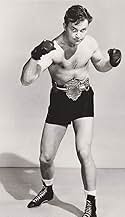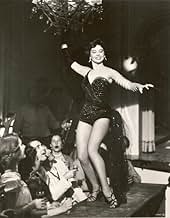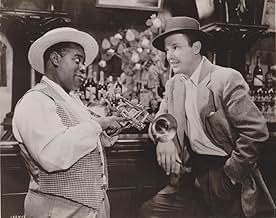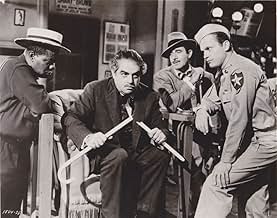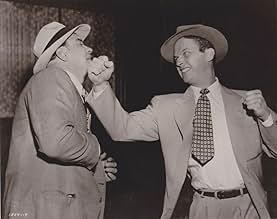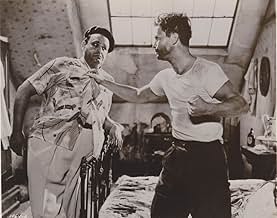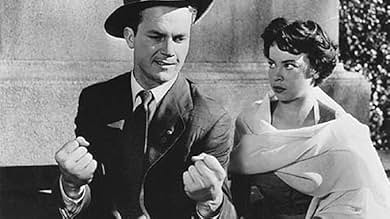Ajouter une intrigue dans votre langueAn about-to-retire New Orleans newspaper columnist tells the story of a most unforgettable character: boxer Socks Barbarossa.An about-to-retire New Orleans newspaper columnist tells the story of a most unforgettable character: boxer Socks Barbarossa.An about-to-retire New Orleans newspaper columnist tells the story of a most unforgettable character: boxer Socks Barbarossa.
- Fighter
- (non crédité)
- Waiter
- (non crédité)
Avis à la une
THE FILM APPEARS to have been assembled using bits and pieces of other genres from previous periods in Hollywood history. Director Raoul Walsh, himself being if not exactly a sort of living anachronism, was a sort of living, breathing history of the film industry. His own career had begun in the Silents, but before the cameras as actor. (He famously portrayed John Wilkes Booth in D.W. Griffith's BIRTH OF A NATION.)*
SO, CALLING ON his many experience as actor and director to bring us a story that was both similar and yet unlike anything else. The story exists both in a period of time (Post World War II New Orleans, Louisiana) and yet is timeless. Its reference and involvement with the Korean War could just as easily have been World War II. This leads us to believe that the story had been around, sitting on the shelves, gathering dust before it finally got made.
IN MANY RESPECTS the production looks like a comic strip or comic book display of "sequential art". The manner in which the characters, both main and supporting, are made to fit neatly into conformity of their particular pigeon holes. The Judge, Pig and Shadow Johnson (Louis Armstrong) are all prime examples.
AND IN SPEAKING of the cast, we found it to be both well constructed , if just a trifle far ranging. Leslie Caron finds her way into a most unusual portrayal of a potentially gifted ballerina's being forced to perform in dance halls. Louis Armstrong does a fine job of being general purpose good guy and servant. His duties range from boxing corner man, musician and valet to the Judge.
IT IS PERHAPS the one role, odd as it may seem, to showcase the talents of Ralph Meeker as main character, Socks Barbarossa. Being a very complex man with great wisdom and many other eclectic talents. Making the hero a denizen of the gutter (Glory Alley) just adds to the drama.
WE MUST MENTION the role of narrator, retiring newspaper man, Gabr Jordan (John McIntyre), who adds a touch of authenticity to this convoluted, meandering, hybrid of a story.
WE ALSO MUST posit the question: Did John McIntyre ever look young or portray a younger type? NOTE: * As director Raoul Walsh had compiled a tremendous number of very memorable pictures, largely at Warner Brothers. They include: WHITE HEAT, GENTLEMAN JIM, THED STRTAWBERRY BLONDE, HIGH SIERRA, THE ROARING 20's,.......................
So the story of Socks is the plot, and oh what a tangled mess it is. First, Socks is supposed to be heading for the championship in the ring, but one night he just runs away before the fight even starts. He says he is quitting, and will not say why. This is apparently enough for his blind backer, the Judge (Kurt Kasnar), to turn from friend to enemy. Every time he sees the guy he practically hisses and spits on him Come to think of it, I think he does spit on him. Socks is in love with Angie, the Judge's daughter (Leslie Caron), and she wisely postpones their wedding because married women can't work burlesque, which is what she has been doing and Socks is not trained to do anything but fight.
So Socks hits the skids for awhile, drinking his troubles away, and then joins the army and goes to Korea where he wins the Congressional medal of honor. He comes back, feted by military brass and the political elite of New Orleans, but after awhile he is forgotten again. So he picks up where he left off before Korea, whining endlessly about how bad he has it. I think he was going for the Frank Sinatra, "I'd-have-no-luck-if-it-wasn't-bad" vibe, but Meeker just plays this like a 20-something that never grew up. He lacks Sinatra's ability to project an interesting melancholy mystique.
I'll let you see how this film meanders to its confusing conclusion. It is probably worth a look for a few reasons that have nothing to do with the main character or the plot. For one you have musical interludes featuring the musical talent of the great Louis Armstrong and the dancing of Leslie Caron who does the best she can with a part in which she is completely miscast. Also, the film does have great atmosphere. You feel like you are on the gritty rain soaked streets of New Orleans back before it became riddled with crime and was just full of characters. You can almost hear Marlon Brando tear his tee shirt while crying "Stella!" somewhere out there in the French quarter.
Thus it's a 50/50 proposition as to whether it is worth your time.
Le saviez-vous
- AnecdotesNone of the songs performed in the film are listed in the on-screen credits. In addition to the songs Louis Armstrong performed in the film, he recorded another song, "It's a Most Unusual Day," by Jimmy McHugh and Harold Adamson, but it was cut. That outtake, several songs from this film, plus songs from other Louis Armstrong M-G-M films, were included on a CD anthology entitled "Now You Has Jazz: Louis Armstrong at M-G-M," released in 1997 by Rhino Records.
- GaffesAt the 40 minute mark, Angie begins reading a letter from Socks. As she holds up the one-page letter, it is clear that there is no writing on the back of the letter. However, she turns the letter over and seems to be reading the back of the letter. After dancing in the living room, she picks up the letter again, and the entire front page is visible, and one can see that the entire letter is written on the front page only.
- Citations
Gabe Jordan: Politicians aren't New Orleans. For the real story you gotta go to the - real people. The people of desire on Piety Street. The people of piety on Desire Street. And the people of good intentions on Bourbon Street. My street. My favorite beat. It has more grifters, grafters, guzzlers, and guts than any other street in the world. Buccaneers Alley, Thieves Alley, and this stretch, the block I call Glory Alley. Glory Alley - a world of square guys with round edges. Where love with larceny, courage and crime, nobility and amorality, come out of the same barrel. Beer barrel or whiskey barrel, preferably bourbon. Life is fundamental to mugs, pugs, and lugs. You settle it with fists or rationalize it with dreams out of a bottle. Yet, in the bottom of life's gutter, you can find, if you look up hard enough, more beauty, dignity and sensitivity, than anywhere else in the world. Has beens, might have beens, never was it, and - champions.
- ConnexionsEdited from Modern New Orleans (1940)
- Bandes originalesGlory Alley
(uncredited)
Music by Jay Livingston
Lyrics by Mack David
Sung by chorus over opening credits and at the end
Meilleurs choix
Détails
Box-office
- Budget
- 971 000 $US (estimé)
- Durée1 heure 19 minutes
- Couleur
- Rapport de forme
- 1.37 : 1
Contribuer à cette page


